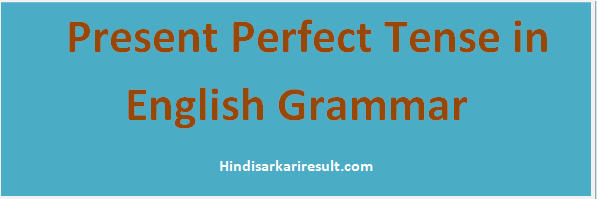
Present Perfect Tense in English Grammar / हिंदी से English में अनुवाद करने के नियम
Present Perfect Tense में हिन्दी वाक्यों के अन्त में चुका है, चुकी है, चुके हैं, चुका हूँ, चुके हो, या है, यी है, ये हैं, या हूँ, ए हैं, आ हूँ आदि आता है इस tense के वाक्यों को पढ कर पता चलता है कि कार्य हाल ही में समाप्त हुआ है।
Example:
- मैं अपना गृह कार्य कर चुका हूँ।
- I have completed my homework.
- मैंने आपको नहीं पहचाना है।
- I have not recognized you.
- क्या तुमने स्नान कर लिया है?
- Have you bathed?
- तुमने उसे क्या दिया है?
- What has he given to you?
- क्या तुमने कभी ताजमहल देखा है?
- Have you ever watched the Tajmahal?
- आदि।
पहचान : चुका है , चुकी है , चुके है , लिया है
Rule : Sub + have/has + V3 + Obj
Rules of Translation अनुवाद करने के नियम
- Present Perfect Tense में affirmative sentences का अनुवाद करते समय सबसे पहले Subject लिखते हैं।
- इसके बाद has या have में से कोई एक subject के अनुसार लिखते हैं।
- यदि Subject एक वचन (singular number) हो तो has लिखते हैं।
- यदि Subject बहुवचन (plural number) हो तो have लिखते हैं।
- I के साथ have का use होता है।
- इसके बाद verb 3rd form लिखते हैं।
- इसके बाद object
- इसके बाद अगर Sentence में कोई और शब्द हो तो उसकी अँग्रेज़ी लिखते हैं।
Formula:
Subject + has/have + verb(3rd form) + object + ……….
Affirmative Sentences (साधारण वाक्य)
- मै अपना काम कर चुका हूं \ मैंने अपना काम कर लिया है।
- I have done my work.
- हम उसे रुपये दे चुके है।
- We have given money to him.
- वह किताब खरीद चुका है।
- He has purchased the book.
- भारत मैच जीत चुका है।
- India has won the match.
- वह पत्र लिख चुकी है।
- She has written the letter.
Negative Sentences (नकारात्मक वाक्य)
Negative Sentences को हिन्दी से English में translate करते समय verb से पहले not लिखते हैं। कभी नहीं के लिए never का use करते हैं।
Formula:
Subject + has/have + not + verb (3rd form) + object + ……….
- वह मेरी मदद नहीं कर चुका है।
- He has not helped me.
- बच्चे घर नहीं जा चुके है।
- The children have not reached home.
- आप उससे बात नहीं कर चुके है।
- You have not talked to him.
- हम उसे धोखा नहीं दे चुके है।
- We have not cheated him.
- मैंने कभी ताजमहल नहीं देखा है।
- I have never seen the Taj Mahal.
Interrogative Sentences Type 1 (प्रश्नवाचक वाक्य)
जब वाक्य के शुरू में क्या हो:
Formula:
Has/Have + subject + verb(3rd form) + object + ……….
- क्या वे फिल्म देख चुके है?
- Have they seen the film?
- क्या शिक्षक अंग्रेजी पढ़ा चुके है ?
- Has the teacher taught English?
- क्या वह यहाँ आ चुकी है ?
- Has she come here?
- क्या कविता गीत गा चुकी है ?
- Has Kavita sung a song?
Interrogative Sentences Type 2 (प्रश्नवाचक वाक्य)
जब वाक्य के बीच में question हो:
Formula:
Question Word + has/have + subject + verb(3rd form) + object + ……….
- वह कहाँ पहुँच चुका है ?
- Where has he reached?
- आप उसे क्या बता चुके है ?
- What have you told him?
- तुम उसे कहाँ भेज चुके हो ?
- Where have you sent him?
Interrogative Negative Sentences (प्रश्नवाचक नकारात्मक वाक्य)
जब interrogative वाक्य में not भी आ रहा हो तो ऐसे वाक्यों को Interrogative Negative Sentences कहते हैं।
Negative Interrogative sentences को translate करते समय verb से पहले not लिखते हैं। बाकी rules interrogative की तरह हैं
Formula:
Has/Have + subject + not + verb(3rd form) + object + ………..
Question Word + has/have + subject + not + verb(3rd form) + object + ………..
Example:
- क्या तुम कभी दिल्ली नहीं गये हो?
- Have you never gone to Delhi?
- क्या तुमने कभी लन्दन की सैर नहीं की है?
- Have you never visited to London?
- क्या इस घर में कोई नहीं आया है?
- Has no one come in this house?
- उसने नई कार क्यों नहीं खरीदी है?
- Why has he not bought a new car?
- मास्टर जी ने उसे फटकार क्यों नहीं लगायी है?
- Why has the teacher not rebuked him?
- उस लडके ने यह नॉविल क्यों नहीं पढा है?
- Why has that boy not read this novel?
- उस लडकी ने इस कमरे में डांस क्यों नहीं किया है?
- Why has that girl not danced in this room?
- किसने दूकान से किताबें नहीं खरीदी हैं?
- Who has not bought the books from the shop?
- तुमने कठिन परिश्रम क्यों नहीं किया है?
- Why have you not worked hard?
- तुमने वह फिल्म क्यों नहीं देखी है?
- Why have you not watched that movie?
इसे भी पढ़ें: Present Perfect Continuous Tense (Hindi से English बनाने के Rules)
Exercise for Practice:
- सुरेश घर जा चुका हूँ।
- राम ने मुझे वह किताब दे दी है।
- लड़कीवालों ने मुझे देख लिया है।
- आज सोहन स्कूल नहीं गया है।
- उसने कभी ताजमहल नहीं देखा है।
- रामू बाज़ार से सब्ज़ी नहीं लाया है।
- क्या तुमने कभी ताजमहल देखा है?
- क्या मंत्रीजी स्टेज पर पहुँच चुके हैं?
- क्या तुमने नया मोबाइल खरीद लिया है?
- आज तुमने स्कूल में क्या देखा है?
- आज पहले घन्टे में किसने पढाया है?
- यह सब किसने किया है?
- क्या लूसी कभी दिल्ली नहीं गयी है?
- तुमने कठिन परिश्रम क्यों नहीं किया है?

Leave a Reply